44% of Americans are pessimistic about the next four years with President Trump
What Americans saw in President Trump as he was inaugurated nearly 100 days ago is more or less the same things they see today: opinions of his qualities and his Presidency have changed little. The public is more negative than positive about his performance, and most continue to find weaknesses in his honesty, empathy and temperament.
In the latest Economist/YouGov Poll, 42% approve of the way Donald Trump is handing his job. While that marks a lower rating than presidents usually have on their 100th day in office (for example, 59% approved of the way Barack Obama was handling his job in the Economist/YouGov Poll marking his 100 days in office), it is generally unchanged from President Trump’s approval rating throughout his term. There has been almost no variation in the level of public approval or disapproval since the end of January.
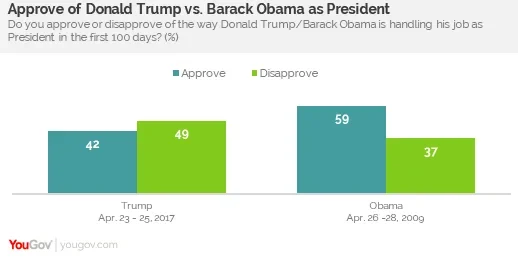
Similarly, the overall assessments of Trump characteristics have changed little. Today, just over a third view him as honest and trustworthy, think he cares about them even somewhat, and view him as having the right temperament for the presidency. All those evaluations have changed little since January.
Although one can describe highlighting of a President’s first 100 days as meaningful or as “ridiculous” (and President Trump has done both), the first 100 days has become a standard milestone for measuring presidential accomplishments since the time of Franklin Roosevelt. It is a high-water mark for some presidents. However, evaluations of President Trump may be different. Just 31% of the public say he has performed better than they expected, and about the same percentage (35%) say he has performed worse than expected. Trump voters make up the lion’s share of those who say the President has performed better than expected.
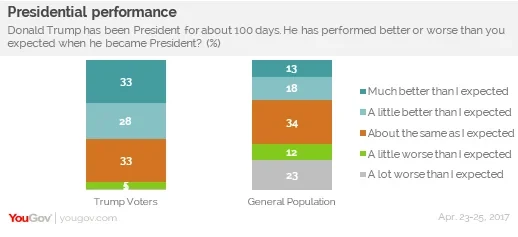
This Administration has missed the usual burst of public optimism given to new presidents. 44% of Americans are pessimistic about the next four years; 37% are optimistic. And even though there has been an increase in the share of the public that thinks the country is headed in the right direction since the election, a majority continue to think the country is on the wrong track.
On many specific items, President Trump fares more poorly in public opinion than Barack Obama did eight years ago. Even in two areas of relative strength, like the economy and terrorism, the President gets lower approval ratings than those Americans gave to Obama in April 2009.
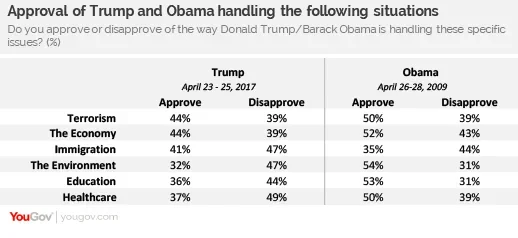
Obama’s first 100 days came at a time of economic crisis; today, many Americans see the economy as improving, and fewer say the economy has gotten worse in President Trump’s first 100 days than thought that about Barack Obama’s first 100 days. Still, Obama’s overall economic approval rating was higher than Trump’s. Similarly, more today say the country became safer from terrorism during Trump’s first 100 days than thought that had been the case under Obama, but the former President’s overall rating on terrorism was higher than the rating given the current President. On issues where President Trump has been criticized, his ratings are clearly worse than President Obama’s were at this point in his administration.
That may be as likely to be caused by personal qualities as by policy criteria. Americans generally liked Obama; they like Trump much less.
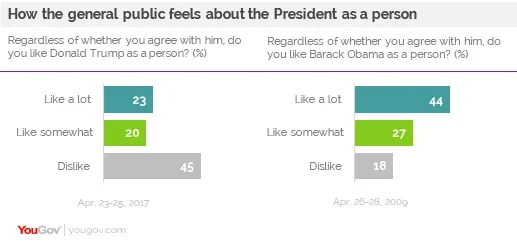
But 100 days will turn into 200, and then into a year and beyond. This week, the President must work with the GOP-controlled Congress (which itself gets only a 12% approval rating) to try and avoid a government shutdown. Most Americans agree with President Trump’s postponement of any demand to Congress to fund a wall on the U.S.-Mexican border as part of any spending bill passed to avert a government shutdown. Only 17% overall – and just 39% of his own voters – would choose insisting on providing $3 billion to start constructing that wall, even at the risk of shutting down the government.
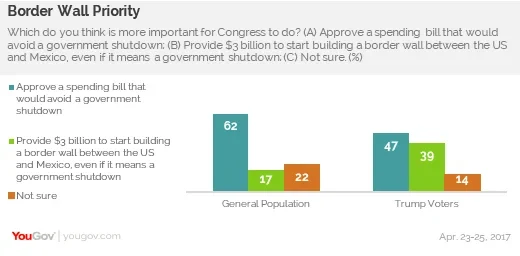
But Americans reject some of the President’s budgetary goals. As many would increase spending on domestic programs as would increase spending on defense. By 52% to 29% they reject eliminating funding for PBS, NPR, the National Endowment for the Arts and the National Endowment for Humanities. And if an increase in defense spending means an equivalent cut in domestic spending, Americans reject that, too.
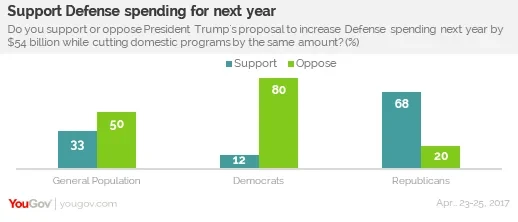
Most Republicans see things differently. 59% would eliminate funding for the arts programs, and two-thirds would accept a reduction in domestic spending to increase defense expenditures.








